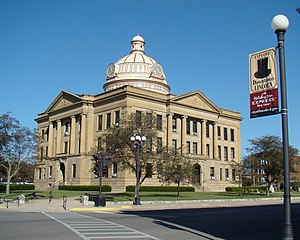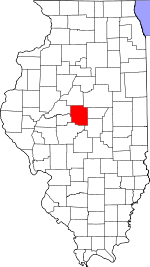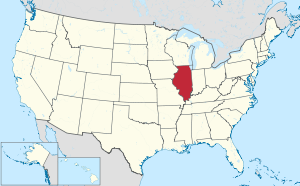Logan County, Illinois
Logan County | |
|---|---|
 | |
 Location within the U.S. state of Illinois | |
 Illinois's location within the U.S. | |
| Coordinates: 40°08′N 89°22′W / 40.13°N 89.36°W | |
| Country | |
| State | |
| Founded | February 15, 1839 |
| Named for | John A. Logan |
| Seat | Lincoln |
| Largest city | Lincoln |
| Area | |
| • Total | 619 sq mi (1,600 km2) |
| • Land | 618 sq mi (1,600 km2) |
| • Water | 0.9 sq mi (2 km2) 0.1% |
| Population (2010) | |
| • Total | 30,305 |
| • Density | 49/sq mi (19/km2) |
| Time zone | UTC−6 (Central) |
| • Summer (DST) | UTC−5 (CDT) |
| Congressional district | 18th |
| Website | www |
Logan County is a county located in the U.S. state of Illinois. According to the 2010 census, it had a population of 30,305.[1] Its county seat is Lincoln.[2]
Logan County comprises the Lincoln, IL Micropolitan Statistical Area, which is included in the Springfield-Jacksonville-Lincoln, IL Combined Statistical Area.
History
Established in 1839, Logan County was named after physician and State Representative John Logan, father of Union General John Alexander Logan.[1]
-
Logan County from the time of its creation to 1841
-
Logan County between 1841 and 1845
-
In 1845, a portion of Dewitt County was ceded to Logan, bringing it to its current size
Geography
According to the U.S. Census Bureau, the county has a total area of 619 square miles (1,600 km2), of which 618 square miles (1,600 km2) is land and 0.9 square miles (2.3 km2) (0.1%) is water.[3]
Climate and weather
| Lincoln, Illinois | ||||||||||||||||||||||||||||||||||||||||||||||||||||||||||||
|---|---|---|---|---|---|---|---|---|---|---|---|---|---|---|---|---|---|---|---|---|---|---|---|---|---|---|---|---|---|---|---|---|---|---|---|---|---|---|---|---|---|---|---|---|---|---|---|---|---|---|---|---|---|---|---|---|---|---|---|---|
| Climate chart (explanation) | ||||||||||||||||||||||||||||||||||||||||||||||||||||||||||||
| ||||||||||||||||||||||||||||||||||||||||||||||||||||||||||||
| ||||||||||||||||||||||||||||||||||||||||||||||||||||||||||||
In recent years, average temperatures in the county seat of Lincoln have ranged from a low of 15 °F (−9.4 °C) in January to a high of 86 °F (30 °C) in July, although a record low of −29 °F (−33.9 °C) was recorded in December 1914 and a record high of 113 °F (45 °C) was recorded in July 1936. Average monthly precipitation ranged from 1.55 inches (39.4 mm) in February to 4.42 inches (112.3 mm) in May.[4]
Major highways
 Interstate 55
Interstate 55 Interstate 155
Interstate 155 U.S. Highway 136
U.S. Highway 136 Illinois Route 10
Illinois Route 10 Illinois Route 54
Illinois Route 54 Illinois Route 121
Illinois Route 121
Adjacent counties
- Tazewell County - north
- McLean County - northeast
- De Witt County - east
- Macon County - southeast
- Sangamon County - south
- Menard County - west
- Mason County - northwest
Demographics
| Census | Pop. | Note | %± |
|---|---|---|---|
| 1840 | 2,634 | — | |
| 1850 | 14,226 | 440.1% | |
| 1860 | 18,257 | 28.3% | |
| 1870 | 21,014 | 15.1% | |
| 1880 | 21,296 | 1.3% | |
| 1890 | 25,489 | 19.7% | |
| 1900 | 28,680 | 12.5% | |
| 1910 | 30,216 | 5.4% | |
| 1920 | 29,562 | −2.2% | |
| 1930 | 28,863 | −2.4% | |
| 1940 | 29,438 | 2.0% | |
| 1950 | 30,671 | 4.2% | |
| 1960 | 33,656 | 9.7% | |
| 1970 | 33,538 | −0.4% | |
| 1980 | 31,802 | −5.2% | |
| 1990 | 30,798 | −3.2% | |
| 2000 | 31,183 | 1.3% | |
| 2010 | 30,305 | −2.8% | |
| 2016 (est.) | 29,527 | [5] | −2.6% |
| U.S. Decennial Census[6] 1790-1960[7] 1900-1990[8] 1990-2000[9] 2010-2013[1] | |||
The 2010 census reports there were 30,305 people; 12,107 households; and 7,274 families residing in the county. The population density was 49 people per square mile (19/km²). The racial makeup of the county included the following percentages non-Hispanic: 87.7% White, 7.4% Black or African American, 0.2% Native American, 0.6% Asian, 5 persons Pacific Islander, 12 persons from other races, and 1.1% from two or more races. 2.9% of the population were Hispanic or Latino of any race.
There were 11,070 households out of which 29.7% had children under the age of 18 living with them, 50.3% were married couples living together, 10.6% had a female householder with no husband present, and 34.3% were non-families. 29.4% of all households contained individuals who were 65 years of age or older. The average household size was 2.34 and the average family size was 2.85.
14.4% of the population were living in group quarters including 11.4% of the population instituitionalized.[2]
According to the 2010 United States Census, there were 30,305 people, 11,070 households, and 7,274 families residing in the county.[10] The population density was 49.0 inhabitants per square mile (18.9/km2). There were 12,107 housing units at an average density of 19.6 per square mile (7.6/km2).[3] The racial makeup of the county was 89.1% white, 7.5% black or African American, 0.6% Asian, 0.2% American Indian, 1.2% from other races, and 1.3% from two or more races. Those of Hispanic or Latino origin made up 2.9% of the population.[10] In terms of ancestry, 30.9% were German, 17.4% were American, 13.1% were Irish, and 10.8% were English.[11]
Of the 11,070 households, 29.7% had children under the age of 18 living with them, 50.3% were married couples living together, 10.6% had a female householder with no husband present, 34.3% were non-families, and 29.2% of all households were made up of individuals. The average household size was 2.34 and the average family size was 2.85. The median age was 39.4 years.[10]
The median income for a household in the county was $48,999 and the median income for a family was $63,245. Males had a median income of $43,940 versus $31,783 for females. The per capita income for the county was $22,063. About 6.8% of families and 9.8% of the population were below the poverty line, including 15.1% of those under age 18 and 5.2% of those age 65 or over.[12]
Communities

Cities
Villages
Census-designated places
Unincorporated communities
Townships
Government and infrastructure

The Illinois Department of Corrections Logan Correctional Center is located in unincorporated Logan County, near Lincoln.[13]
Politics
In the period following the Civil, War Logan was a swing county, following the popular vote winner in every election up to 1936 except those of 1900 and 1916. Since 1940, when its isolationist sentiment drove voters to Wendell Willkie, Logan has become a strongly Republican county. No Democratic Presidential candidate has won Logan County since Lyndon Johnson’s 1964 landslide over Barry Goldwater. In fact, apart from Johnson, Illinoian Barack Obama in 2008 is the solitary Democrat to reach forty percent in the past nineteen elections.
| Year | Republican | Democratic | Third Parties |
|---|---|---|---|
| 2016 | 66.0% 8,181 | 26.7% 3,313 | 7.3% 907 |
| 2012 | 64.9% 7,844 | 32.9% 3,978 | 2.2% 266 |
| 2008 | 57.4% 7,429 | 40.6% 5,250 | 2.0% 262 |
| 2004 | 67.7% 9,112 | 31.7% 4,273 | 0.6% 82 |
| 2000 | 62.3% 8,141 | 35.2% 4,600 | 2.5% 324 |
| 1996 | 52.8% 6,518 | 37.4% 4,618 | 9.8% 1,209 |
| 1992 | 46.3% 6,567 | 36.4% 5,169 | 17.3% 2,459 |
| 1988 | 63.9% 8,490 | 35.6% 4,727 | 0.5% 69 |
| 1984 | 70.7% 9,932 | 28.9% 4,052 | 0.4% 62 |
| 1980 | 67.4% 9,681 | 27.3% 3,916 | 5.4% 769 |
| 1976 | 59.9% 8,623 | 39.5% 5,686 | 0.5% 77 |
| 1972 | 70.0% 10,277 | 29.9% 4,395 | 0.1% 20 |
| 1968 | 60.5% 8,638 | 31.9% 4,552 | 7.7% 1,099 |
| 1964 | 46.9% 6,805 | 53.1% 7,712 | |
| 1960 | 62.2% 9,383 | 37.7% 5,691 | 0.1% 16 |
| 1956 | 66.6% 9,589 | 33.3% 4,793 | 0.1% 14 |
| 1952 | 64.4% 9,162 | 35.5% 5,048 | 0.1% 19 |
| 1948 | 60.4% 7,431 | 39.3% 4,832 | 0.4% 49 |
| 1944 | 61.9% 7,955 | 37.9% 4,868 | 0.2% 29 |
| 1940 | 56.8% 8,929 | 42.9% 6,753 | 0.3% 43 |
| 1936 | 46.5% 7,019 | 52.3% 7,886 | 1.2% 182 |
| 1932 | 41.4% 5,850 | 57.5% 8,119 | 1.0% 147 |
| 1928 | 60.0% 7,631 | 39.4% 5,019 | 0.6% 75 |
| 1924 | 57.2% 7,063 | 30.0% 3,708 | 12.8% 1,585 |
| 1920 | 64.8% 6,957 | 30.1% 3,232 | 5.1% 549 |
| 1916 | 48.3% 5,933 | 46.6% 5,726 | 5.2% 635 |
| 1912 | 20.8% 1,397 | 48.2% 3,229 | 31.0% 2,075 |
| 1908 | 47.4% 3,451 | 48.7% 3,546 | 3.8% 278 |
| 1904 | 51.2% 3,626 | 42.5% 3,005 | 6.3% 445 |
| 1900 | 47.7% 3,501 | 50.1% 3,672 | 2.2% 162 |
| 1896 | 49.3% 3,430 | 48.7% 3,389 | 2.0% 138 |
| 1892 | 42.5% 2,619 | 51.2% 3,150 | 6.3% 387 |
Notable people
- Brian Cook, NBA player[15]
- Norm Cook, NBA player[16]
- Terry Kinney, actor[17]
- Edward Madigan, Former United States Secretary of Agriculture
- William Keepers Maxwell, Jr., editor, novelist, short story writer
See also
References
- ^ a b "State & County QuickFacts". United States Census Bureau. Archived from the original on July 14, 2011. Retrieved July 6, 2014.
{{cite web}}: Unknown parameter|deadurl=ignored (|url-status=suggested) (help) - ^ "Find a County". National Association of Counties. Retrieved 2011-06-07.
- ^ a b "Population, Housing Units, Area, and Density: 2010 - County". United States Census Bureau. Retrieved 2015-07-12.
- ^ a b "Monthly Averages for Lincoln, Illinois". The Weather Channel. Retrieved 2011-01-27.
- ^ "Population and Housing Unit Estimates". Retrieved June 9, 2017.
- ^ "U.S. Decennial Census". United States Census Bureau. Retrieved July 6, 2014.
- ^ "Historical Census Browser". University of Virginia Library. Retrieved July 6, 2014.
- ^ "Population of Counties by Decennial Census: 1900 to 1990". United States Census Bureau. Retrieved July 6, 2014.
- ^ "Census 2000 PHC-T-4. Ranking Tables for Counties: 1990 and 2000" (PDF). United States Census Bureau. Retrieved July 6, 2014.
- ^ a b c "DP-1 Profile of General Population and Housing Characteristics: 2010 Demographic Profile Data". United States Census Bureau. Retrieved 2015-07-12.
- ^ "DP02 SELECTED SOCIAL CHARACTERISTICS IN THE UNITED STATES – 2006-2010 American Community Survey 5-Year Estimates". United States Census Bureau. Retrieved 2015-07-12.
- ^ "DP03 SELECTED ECONOMIC CHARACTERISTICS – 2006-2010 American Community Survey 5-Year Estimates". United States Census Bureau. Retrieved 2015-07-12.
- ^ "Logan Correctional Center." Illinois Department of Corrections. Retrieved on October 12, 2010. "1096 1350th Street P.O. Box 1000 Lincoln, Il 62656"
- ^ http://uselectionatlas.org/RESULTS
- ^ Brian Cook Stats, Bio and Game Logs | NBA.com
- ^ Norm Cook NBA & ABA Stats | Basketball-Reference.com
- ^ Terry Kinney - IMDb




